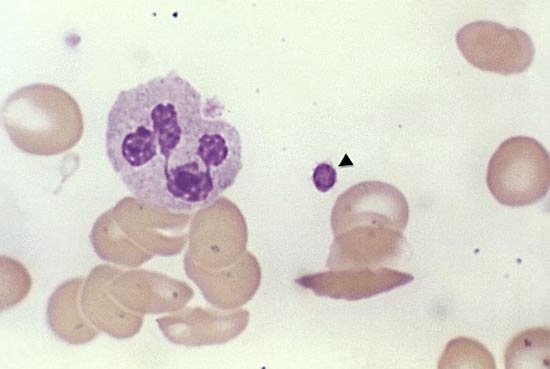platelet
blood cell
also called thrombocyte
 colourless, nonnucleated blood component that is important in the formation of blood clots ( coagulation). Platelets are found only in the blood of mammals.
colourless, nonnucleated blood component that is important in the formation of blood clots ( coagulation). Platelets are found only in the blood of mammals.Platelets are formed when cytoplasmic fragments of megakaryocytes, which are very large cells in the bone marrow, pinch off into the circulation as they age. They are stored in the spleen. Some evidence suggests platelets may also be produced or stored in the lungs, where megakaryocytes are frequently found.
Platelets play an important role in the formation of a blood clot (coagulation) by aggregating to block a cut blood vessel and provide a surface on which strands of fibrin form an organized clot, by contracting to pull the fibrin strands together to make the clot firm and permanent, and, perhaps most important, by providing or mediating a series of clotting factors necessary to the formation of the clot. Platelets also store and transport several chemicals, including serotonin, epinephrine (epinephrine and norepinephrine), histamine, and thromboxane; upon activation these molecules are released and initiate local blood vessel constriction, which facilitates clot formation.
At birth the number of platelets is low, but by three months of age the adult level is reached. The number of platelets rises following trauma or asphyxiation, at high altitudes, after exercise, and in cold temperatures; the number may be temporarily lowered by menstruation in women. Certain chemicals may prolong the life of platelets; smoking is believed to shorten their life spans.
- Lyman, Jr. Spitzer
- Lyman (Louis) Lemnitzer
- Lyman Reed Blake
- Lyman Spitzer, Jr.
- Lyman Trumbull
- Lyme disease
- Lyme Regis
- Lymon, Frankie, and the Teenagers
- lymph
- lymphatic system
- lymphedema
- lymph node
- lymph nodule
- lymphoblast
- lymphocyte
- lymphocytic choriomeningitis
- lymphogranuloma venereum
- lymphoid tissue
- lymphoma
- Lynch, Benito
- Lynchburg
- lynching
- Lynch, Jack
- Lynch, John R
- Lyndon Baines Johnson: Inaugural Address